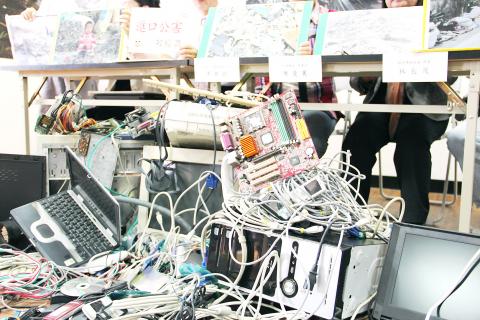Environmental activists yesterday urged the government not to exclude scrap metal, including electrical and electronics equipment, from its definition of hazardous industrial waste, as this would allow its import into Taiwan.
The Environmental Protection Administration (EPA) is considering amending the Standards for Defining Hazardous Industrial Waste (有害事業廢棄物認定標準) to exclude 12 types of scrap metal — including wires, computers, household electronics, telecom products and printed circuit boards — and redefine them as general industrial waste, which are not banned from import into the nation, environmental advocates said.
Showing photographs taken years ago of waste circuit boards and wires piled up along the banks of the Erjen River (二仁溪), with hundreds of fish lying dead on sections of the river bank, the groups said they fear that once the standards are amended, the public would see a repetition of those horrific scenes of rivers polluted by toxic chemicals across the nation.

Photo: CNA
Homemakers United Foundation president Chen Man-li (陳曼麗) said 1,800 tonnes of domestic industrial waste are created each year, and while the EPA claims a high recycling rate of 82 percent, many toxic substances, such as furnace slag ashes, remain and pollute the environment.
“Don’t we have enough domestic industrial waste to worry about?” Chen asked.
“The public is now worried about the safety of adulterated edible oil products, but the pollution from recycling these scrap metals may affect an even bigger portion of our living environment,” she said.
Tainan Community University Research and Development Association director Huang Huan-chang (黃煥彰) said since the early 1970s, the scrap metal recycling industry by the Erjen River has already caused irreversible heavy pollution to the air, water and soil, from the burning of plastic parts and pickling metal with strong liquid acid to extract precious metals.
He said that the high level of dioxins in the air and heavy metal contamination in the water and soil near the Erjen River led a Canadian researcher to define the area as “unsuitable for living” in 1983. The pollution was finally halted by the government, which spent up to NT$4.2 billion (US$142.5 million) for river remediation over the past two to three decades.
Taiwan Watch Institute director Herlin Hsieh (謝和霖) said many of the waste electronic products contain brominated flame retardant, which may release highly toxic polybrominated dibenzo-p-dioxins and dibenzofurans when burned and are endocrine disrupting chemicals that may affect the brain.
“The main objective of the Basel Convention on the Control of Transboundary Movements of Hazardous Wastes and their Disposal is to restrict transboundary movements of hazardous wastes,” Huang said.
“Taiwan is a small island that cannot afford to become a hazardous waste treatment center for other countries,” Huang said.
In response, EPA Department of Waste Management director Wu Tien-chi (吳天基) said that while the nation lacks resources, it is an electronics export-oriented economy.
To vertically integrate the industry from manufacturing to consumption to recycling, the EPA is considering allowing the import of scrap metal to aid the development of the recycling industry.
Recycling companies will be required to report their treatment process, and the remaining waste substances will be disposed of using legal facilities, he added.

ANOTHER EMERGES: The CWA yesterday said this year’s fourth storm of the typhoon season had formed in the South China Sea, but was not expected to affect Taiwan Tropical Storm Gaemi has intensified slightly as it heads toward Taiwan, where it is expected to affect the country in the coming days, the Central Weather Administration (CWA) said yesterday. As of 8am yesterday, the 120km-radius storm was 800km southeast of Oluanpi (鵝鑾鼻), Taiwan’s southernmost tip, moving at 9kph northwest, the agency said. A sea warning for Gaemi could be issued tonight at the earliest, it said, adding that the storm is projected to be closest to Taiwan on Wednesday or Thursday. Gaemi’s potential effect on Taiwan remains unclear, as that would depend on its direction, radius and intensity, forecasters said. Former Weather Forecast

As COVID-19 cases in Japan have been increasing for 10 consecutive weeks, people should get vaccinated before visiting the nation, the Centers for Disease Control (CDC) said. The centers reported 773 hospitalizations and 124 deaths related to COVID-19 in Taiwan last week. CDC Epidemic Intelligence Center Director Guo Hung-wei (郭宏偉) on Tuesday said the number of weekly COVID-19 cases reported in Japan has been increasing since mid-May and surpassed 55,000 cases from July 8 to July 14. The average number of COVID-19 patients at Japan’s healthcare facilities that week was also 1.39 times that of the week before and KP.3 is the dominant

The Chinese Communist Party’s (CCP) working group for Taiwan-related policies is likely to be upgraded to a committee-level body, a report commissioned by the Mainland Affairs Council (MAC) said. As Chinese President Xi Jinping (習近平) is increasingly likely to upgrade the CCP’s Central Leading Group for Taiwan Affairs, Taiwanese authorities should prepare by researching Xi and the CCP, the report said. At the third plenary session of the 20th Central Committee of the CCP, which ended on Thursday last week, the party set a target of 2029 for the completion of some tasks, meaning that Xi is likely preparing to

US-CHINA TRADE DISPUTE: Despite Beijing’s offer of preferential treatment, the lure of China has dimmed as Taiwanese and international investors move out Japan and the US have become the favored destinations for Taiwanese graduates as China’s attraction has waned over the years, the Ministry of Labor said. According to the ministry’s latest income and employment advisory published this month, 3,215 Taiwanese university graduates from the class of 2020 went to Japan, surpassing for the first time the 2,881 graduates who went to China. A total of 2,300 graduates from the class of 2021 went to the US, compared with the 2,262 who went to China, the document showed. The trend continued for the class of 2023, of whom 1,460 went to Japan, 1,334 went to